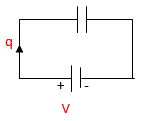Loss of Energy in Charging of Capacitors
Description:
Whenever there is transformation of energy, some energy is lost in form of heat. To identify the loss of energy on charging a capacitor, a capacitor having capacitance(C) is connected to a source of energy (battery). Let ‘V’ be the potential difference across terminals of the battery and ‘q’ be the amount of charge flowing through it towards the plate A of capacitor. As the charge reaches the capacitor, plate A acquires positive charge and due to induction plate B acquires equal amount negative charge thereby developing the same potential difference (V) as that of battery.

Potential at capacitor = V
If q is the charge coming out of battery and V is its potential difference,
Then, Potential energy given by battery = U = qV
As charge reaches the capacitor, energy stored within it becomes
Uc = (1/ 2) qV
So, loss in energy = U - Uc
loss in energy = qV - (1/ 2) qV = (1/ 2) qV
This shows that 50 % of battery energy is lost during charging of a capacitor as the energy gets converted to heat produced during motion of charge (q) through capacitor.

